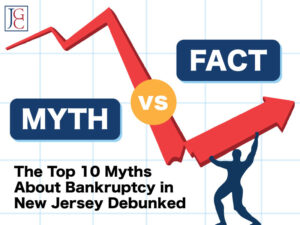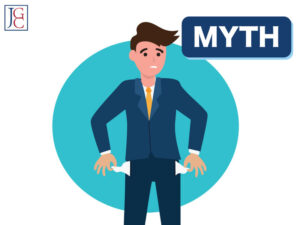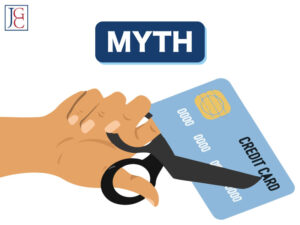 Filing for bankruptcy can be a daunting process. There are many misconceptions and myths about bankruptcy that often prevent people from taking the necessary steps to improve their financial situation. In this article, we will debunk the top 10 myths about bankruptcy in New Jersey.
Filing for bankruptcy can be a daunting process. There are many misconceptions and myths about bankruptcy that often prevent people from taking the necessary steps to improve their financial situation. In this article, we will debunk the top 10 myths about bankruptcy in New Jersey.
Myth #1: Bankruptcy will ruin your credit score forever
Fact: While it is true that bankruptcy will have a negative impact on your credit score, it is not permanent. With time and responsible financial behavior, you can rebuild your credit score. In fact, some people see an improvement in their credit score within a year of filing for bankruptcy.
One of the reasons for the improvement in credit score is that bankruptcy eliminates a significant amount of debt, which reduces your debt-to-income ratio. This ratio is an important factor in determining your credit score. Therefore, by eliminating a large portion of your debt, you may be able to improve your credit score faster than if you were to continue struggling to make minimum payments on your debts.
Myth #2: You will lose all of your assets in bankruptcy
 Fact: This is one of the most common myths about bankruptcy. In New Jersey, there are exemptions that allow you to keep certain assets such as your home, car, and personal belongings. An experienced bankruptcy attorney can help you determine what exemptions apply to your specific case.
Fact: This is one of the most common myths about bankruptcy. In New Jersey, there are exemptions that allow you to keep certain assets such as your home, car, and personal belongings. An experienced bankruptcy attorney can help you determine what exemptions apply to your specific case.
New Jersey’s bankruptcy exemptions are designed to protect your assets and give you a fresh start after bankruptcy. Some of the most commonly used exemptions in New Jersey include the homestead exemption, which allows you to keep your primary residence, and the motor vehicle exemption, which allows you to keep your car.
Myth #3: Bankruptcy will eliminate all of your debt
Fact: While bankruptcy can eliminate many types of debt, there are some debts that cannot be discharged. These include student loans, taxes, and child support payments.
It is important to note that bankruptcy can still be a valuable tool even if it cannot eliminate all of your debts. For example, if you have significant credit card debt, medical bills, or personal loans that you are struggling to pay, bankruptcy may be able to eliminate those debts and give you a fresh start.
Myth #4: You can only file for bankruptcy once in your lifetime
Fact: You can file for bankruptcy more than once in your lifetime, but there are time limits between filings. For example, if you filed for Chapter 7 bankruptcy, you must wait eight years before filing again.
The time limits between filings are designed to prevent people from abusing the bankruptcy system. However, if you are struggling with debt and have already filed for bankruptcy in the past, it is important to speak with an experienced bankruptcy attorney to explore your options.
Myth #5: You have to give up your credit cards if you file for bankruptcy
 Fact: While it is true that some credit card companies may close your account after you file for bankruptcy, you can still apply for new credit cards. However, it is important to use credit responsibly and make timely payments to avoid falling into debt again.
Fact: While it is true that some credit card companies may close your account after you file for bankruptcy, you can still apply for new credit cards. However, it is important to use credit responsibly and make timely payments to avoid falling into debt again.
Many people are surprised to learn that they can still obtain credit after filing for bankruptcy. In fact, some credit card companies specifically target people who have filed for bankruptcy because they know that those individuals are not eligible to file for bankruptcy again for several years. However, it is important to use credit responsibly and avoid falling into debt again.
Myth #6: Bankruptcy is only for people who are unemployed
Fact: Bankruptcy is not limited to unemployed individuals. Anyone can file for bankruptcy if they are struggling to pay their debts.
Many people believe that bankruptcy is only limited to unemployed individuals. However, this is not the case. Bankruptcy is for anyone who is struggling to pay their debts, regardless of their employment status. In fact, some people who file for bankruptcy have steady jobs and income but are still unable to keep up with their debts due to unexpected expenses or other financial challenges.
Myth #7: Bankruptcy is expensive and only for wealthy individuals
Fact: Bankruptcy is designed to help people who are struggling with debt, regardless of their income level. Filing for bankruptcy can be costly, but fortunately, many bankruptcy attorneys understand the financial burden their clients are already facing. They may offer payment plans or other options to make the process more affordable.
Additionally, filing for bankruptcy can actually be a cost-saving measure in the long run. By eliminating or reducing your debt, you can free up money to put towards essential expenses like housing, transportation, and healthcare.
Myth #8: You can choose which debts to include in your bankruptcy filing
Fact: When you file for bankruptcy, you must include all of your debts, regardless of the type or amount. You cannot pick and choose which debts to include in your bankruptcy filing.
This is because bankruptcy is designed to provide a fresh start and eliminate as much debt as possible. Therefore, all of your debts must be included in the filing so that the court can make an accurate determination of your financial situation.
Myth #9: You can keep your bankruptcy filing a secret
Fact: Bankruptcy filings are a matter of public record, which means that anyone can access them. While it may be embarrassing or uncomfortable to have your financial situation made public, it is important to be honest about your situation and work towards a solution.
In fact, hiding your bankruptcy filing from creditors or the court can result in serious legal consequences, including fines and even criminal charges.
Myth #10: Bankruptcy is a sign of failure
Fact: Bankruptcy is not a sign of failure. It is a legal tool that can help individuals and businesses overcome financial challenges and get a fresh start.
Many people who file for bankruptcy do so because they have experienced unexpected financial setbacks, such as a job loss or medical emergency. Bankruptcy can help these individuals get back on their feet and rebuild their financial stability.
In summary, bankruptcy can be a complex and intimidating process, but it doesn’t have to be. With the help of an experienced bankruptcy attorney and a clear understanding of the facts, you can take control of your financial situation and make decisions that will lead to a brighter future.

Filing for bankruptcy can be a daunting process. There are many misconceptions and myths about bankruptcy that often prevent people from taking the necessary steps to improve their financial situation. In this article, we will debunk the top 10 myths about bankruptcy in New Jersey.
Myth #1: Bankruptcy will ruin your credit score forever
Fact: While it is true that bankruptcy will have a negative impact on your credit score, it is not permanent. With time and responsible financial behavior, you can rebuild your credit score. In fact, some people see an improvement in their credit score within a year of filing for bankruptcy.
One of the reasons for the improvement in credit score is that bankruptcy eliminates a significant amount of debt, which reduces your debt-to-income ratio. This ratio is an important factor in determining your credit score. Therefore, by eliminating a large portion of your debt, you may be able to improve your credit score faster than if you were to continue struggling to make minimum payments on your debts.
Myth #2: You will lose all of your assets in bankruptcy

Fact: This is one of the most common myths about bankruptcy. In New Jersey, there are exemptions that allow you to keep certain assets such as your home, car, and personal belongings. An experienced bankruptcy attorney can help you determine what exemptions apply to your specific case.
New Jersey’s bankruptcy exemptions are designed to protect your assets and give you a fresh start after bankruptcy. Some of the most commonly used exemptions in New Jersey include the homestead exemption, which allows you to keep your primary residence, and the motor vehicle exemption, which allows you to keep your car.
Myth #3: Bankruptcy will eliminate all of your debt
Fact: While bankruptcy can eliminate many types of debt, there are some debts that cannot be discharged. These include student loans, taxes, and child support payments.
It is important to note that bankruptcy can still be a valuable tool even if it cannot eliminate all of your debts. For example, if you have significant credit card debt, medical bills, or personal loans that you are struggling to pay, bankruptcy may be able to eliminate those debts and give you a fresh start.
Myth #4: You can only file for bankruptcy once in your lifetime
Fact: You can file for bankruptcy more than once in your lifetime, but there are time limits between filings. For example, if you filed for Chapter 7 bankruptcy, you must wait eight years before filing again.
The time limits between filings are designed to prevent people from abusing the bankruptcy system. However, if you are struggling with debt and have already filed for bankruptcy in the past, it is important to speak with an experienced bankruptcy attorney to explore your options.
Myth #5: You have to give up your credit cards if you file for bankruptcy

Fact: While it is true that some credit card companies may close your account after you file for bankruptcy, you can still apply for new credit cards. However, it is important to use credit responsibly and make timely payments to avoid falling into debt again.
Many people are surprised to learn that they can still obtain credit after filing for bankruptcy. In fact, some credit card companies specifically target people who have filed for bankruptcy because they know that those individuals are not eligible to file for bankruptcy again for several years. However, it is important to use credit responsibly and avoid falling into debt again.
Myth #6: Bankruptcy is only for people who are unemployed
Fact: Bankruptcy is not limited to unemployed individuals. Anyone can file for bankruptcy if they are struggling to pay their debts.
Many people believe that bankruptcy is only limited to unemployed individuals. However, this is not the case. Bankruptcy is for anyone who is struggling to pay their debts, regardless of their employment status. In fact, some people who file for bankruptcy have steady jobs and income but are still unable to keep up with their debts due to unexpected expenses or other financial challenges.
Myth #7: Bankruptcy is expensive and only for wealthy individuals
Fact: Bankruptcy is designed to help people who are struggling with debt, regardless of their income level. Filing for bankruptcy can be costly, but fortunately, many bankruptcy attorneys understand the financial burden their clients are already facing. They may offer payment plans or other options to make the process more affordable.
Additionally, filing for bankruptcy can actually be a cost-saving measure in the long run. By eliminating or reducing your debt, you can free up money to put towards essential expenses like housing, transportation, and healthcare.
Myth #8: You can choose which debts to include in your bankruptcy filing
Fact: When you file for bankruptcy, you must include all of your debts, regardless of the type or amount. You cannot pick and choose which debts to include in your bankruptcy filing.
This is because bankruptcy is designed to provide a fresh start and eliminate as much debt as possible. Therefore, all of your debts must be included in the filing so that the court can make an accurate determination of your financial situation.
Myth #9: You can keep your bankruptcy filing a secret
Fact: Bankruptcy filings are a matter of public record, which means that anyone can access them. While it may be embarrassing or uncomfortable to have your financial situation made public, it is important to be honest about your situation and work towards a solution.
In fact, hiding your bankruptcy filing from creditors or the court can result in serious legal consequences, including fines and even criminal charges.
Myth #10: Bankruptcy is a sign of failure
Fact: Bankruptcy is not a sign of failure. It is a legal tool that can help individuals and businesses overcome financial challenges and get a fresh start.
Many people who file for bankruptcy do so because they have experienced unexpected financial setbacks, such as a job loss or medical emergency. Bankruptcy can help these individuals get back on their feet and rebuild their financial stability.
In summary, bankruptcy can be a complex and intimidating process, but it doesn’t have to be. With the help of an experienced bankruptcy attorney and a clear understanding of the facts, you can take control of your financial situation and make decisions that will lead to a brighter future.
REQUEST A FREE CONSULTATION
Fill out the form below to receive a free and confidential initial consultation. Or call:
732-737-7985

